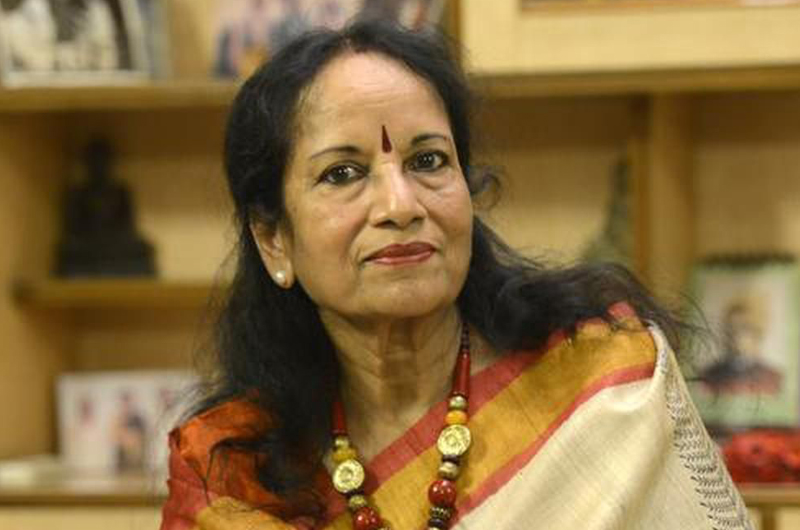The news of Vani Jairam’s passing away in February came like a bolt from the blue for Shoma A. Chatterji, especially when she learnt that she had died from a fall and not of old age or a heart attack or an ailment. Shoma recalls her meeting with the singer and more
I met Vani Jairam almost by accident at the Frankfurt Airport when I was returning from a film festival in Mannheim, Germany. This happened long ago. As we waited at the clearance counter, I took courage in my hands and approached her. Her husband was with her. I asked her if she was Vani Jairam and she smiled and said, yes, just like that.
No airs, no halo. It was a long wait for clearance but this was neither the time nor the place for an interview. Besides, I knew very little about her songs in Southern films as that area was beyond my field. We spoke while in the queue and then dispersed, never to meet again. She was tall and slender and carried herself very gracefully trying not to draw attention to herself.
The news of her passing away in February came like a bolt from the blue for me, especially when I learnt that she died from a fall and not of old age or a heart attack or an ailment. Those tiny moments of meeting her flashed through in my mind. My knowledge of her music was confined to her Hindi film hits like the number Bol Re Papeehara lip-synced by Jaya Bhaduri in Hrishikesh Mukherjee’s Guddi. The breakthrough in Hindi cinema came for Vani through music director Vasant Desai who had spotted her talent – a magical voice that had its own identity distanced from Lata Mangeshkar and Asha Bhonsle.
Composed in Miyan Ki Malhar raag, the song showcased her classical prowess and subsequently fetching her many laurels and awards, including the Tansen Samman (for best classical-based song in a Hindi film), the Lions International Best Promising Singer award, the All India Cinegoers Association Award, and the All India Film-Goers Association award for the Best Playback Singer in 1971. Her other song in the same film, Humko Mann Ki Shakti Dena, became a school prayer since the release of the song in 1971.
Vani toured the entire Maharashtra state, accompanying her mentor, Desai, and taught many Marathi songs to schoolchildren. The song, Mere To Giridhar Gopal, in Meera (1979), composed by Pandit Ravi Shankar, won her first the Filmfare Award for Best Female Playback Singer. She recorded as many as 12 bhajansfor the film Meera, which became popular. A spate of assignments from titans of music, including Naushad, Madan Mohan, R. D. Burman, Laxmikant-Pyarelal, Kalyanji-Anandji and several Marathi and Gujarati music directors kept her busy till the South beckoned.
Vani was recording a song for a film that was being dubbed in Hindi. The Telugu version had N. T. Rama Rao in the lead, and the song was a dance number filmed on Hema Malini. “I had the headphones on – P. Leela’s Telugu original in Atana raga in White-5 Scale was flowing into one ear and I had to match my Hindi version with the live orchestra in C-Sharp that fell on my other ear. The sync had to be perfect. Composer Usha Khanna, who had come over to watch the recording, was so awe-struck that she got emotional,” remembers Vani at one of her numerous interviews.
Vani once narrated details of her training. “My real journey began when I started receiving training in Hindustani classical music from Ustad Abdul Rehman Khan of Patiala Gharana. After I learnt the nuances of thumri, bhajan and ghazals, I gave my first public concert in 1969 in Bombay. I was soon invited by veteran music director Vasant Desai, who introduced me to the Hindi film industry with Guddi. I sang all the five songs in the film. He not only taught me music, but also taught me how to conduct myself as a musician.” Vani’s knowledge of swara and laya is well known, her skill at notation is noteworthy, her potential in public speaking, which makes her a much sought-after celebrity at various dance and music programmes, and the poetess (her poems have been appreciated by stalwarts such as Vairamuthu) and the painter in her (her drawings are a visual treat) are other facets. Naushad, in Naushad Nama, his biography, states, “Vani Jairam’s is the most trained voice. Her Urdu pronunciation is impeccable. I wanted to record a ghazal album in her voice, but it did not materialise.”



 from Webdoux
from Webdoux